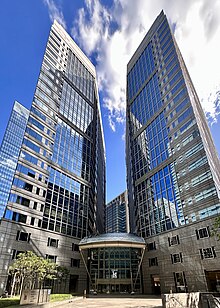Nippon Telegraph and Telephone
 From Wikipedia - Reading time: 15 min
From Wikipedia - Reading time: 15 min
You can help expand this article with text translated from the corresponding article in Japanese. Click [show] for important translation instructions.
|
 | |
 Headquarters at Otemachi 1st Square in Ōtemachi, Chiyoda, Tokyo | |
Native name | 日本電信電話株式会 |
|---|---|
Romanized name | Nippon Denshin Denwa kabushiki gaisha |
| Company type | Public |
| |
| Industry | Telecommunications |
| Predecessor | Nippon Telegraph and Telephone Public Corporation |
| Founded | April 1, 1985 |
| Founder | Government of Japan |
| Headquarters | Ōtemachi, Chiyoda, Tokyo, Japan |
Key people |
|
| Products | |
| Revenue | |
| Total assets | |
| Total equity | |
| Owner | Ministry of Finance (34.25%)[2] |
Number of employees | 303,350 (2021)[1] |
| Parent | NTT Group |
| Subsidiaries | |
| Website | group global |
The Nippon Telegraph and Telephone Corporation[a] (NTT) (Corporate Number: 7010001065142)[3] is a Japanese telecommunications holding company headquartered in Tokyo, Japan. Ranked 55th in Fortune Global 500, NTT is the fourth largest telecommunications company in the world in terms of revenue,[4] as well as the third largest publicly traded company in Japan after Toyota and Sony, as of June 2022.[5] In 2023, the company was ranked 56th in the Forbes Global 2000.[6]
The company is incorporated pursuant to the NTT Law (Law Concerning Nippon Telegraph and Telephone Corporation, Etc.[b]).[7] The purpose of the company defined by the law is to own all the shares issued by Nippon Telegraph and Telephone East Corporation (NTT East) and Nippon Telegraph and Telephone West Corporation (NTT West) and to ensure proper and stable provision of telecommunications services all over Japan including remote rural areas by these companies as well as to conduct research relating to the telecommunications technologies that will form the foundation for telecommunications.
On 1 July 2019, NTT Corporation launched NTT Ltd., an $11 billion de facto holding company business consisting of 28 brands from across NTT Security, NTT Communications and Dimension Data.[8]
While NTT is listed on the Tokyo Stock Exchange and the OTC Markets Group's Pink (and formerly in the New York Stock Exchange under the ticker code "NTT" and in the London Stock Exchange under the ticker code "NPN"), the Japanese government still owns roughly one-third of NTT's shares, regulated by the NTT Law.
History
[edit]

Established as a state monopoly in August 1952 to take over the Japanese telecommunications system operated by AT&T during the Occupation of Japan,[citation needed] Nippon Telegraph and Telephone Public Corporation (日本電信電話公社, Nippon Denshin Denwa Kōsha, shortened into Den-Den Kōsha (電電公社)) was privatized in 1985 to encourage competition in the country's telecom market, making Japan the first Asian country and only the second in the world (after the United States) to deregulate its telecom market. In 1987, NTT made the largest stock offering to date, at US$36.8 billion.[9][10]
Because NTT owns most of Japan's last mile infrastructure (incl. broadband fibre connections), it enjoys oligopolistic control over landlines in Japan. In order to weaken NTT, the company was divided into a holding company (NTT) and three telecom companies (NTT East, NTT West, and NTT Communications) in 1999. The NTT Law regulating NTT East and West requires them to serve only short-distance communications and obligates them to maintain fixed-line telephone service all over the country. They are also obligated to lease their unused optical fiber (dark fiber) to other carriers at regulated rates. NTT Communications is not regulated by the NTT Law.
In July 2010, NTT and South African IT company Dimension Data Holdings announced an agreement of a cash offer from NTT for Dimension Data's entire issued share capital, in £2.12bn ($3.24bn) deal.[11]
In late 2010, NTT's Japan-to-US transpacific network reached 400 Gbit/s. In August 2011, its network capacity was expanded to 500 Gbit/s.[12]
In 2021, Nippon Telegraph & Tel issued green bonds worth about 300 billion yen ($2.7 billion). The bonds include three tranches with maturities of 3, 5 and 10 years. The proceeds will be used for environmentally friendly projects (renewable energy, energy-efficient broadband infrastructure, etc.).[13]
Corporate history timeline
[edit]- 1952 Nippon Telegraph and Telephone Public Corporation established
- 1979 INS Concept announced
- 1985 Nippon Telegraph and Telephone Corporation (NTT) incorporated as a private company
- 1987 NTT listed on the First Section of the Tokyo Stock Exchange
- 1988 NTT DATA Corporation started operations
- 1990 VI&P Concept announced
- 1992 NTT Mobile Communications Network, Inc. (presently NTT DOCOMO) started operations
- 1994 Basic Concept for the Coming Multimedia Age announced
- 1995 NTT DATA listed on the Second Section of the Tokyo Stock Exchange
- 1996 21st Century R&D Vision announced
- 1996 NTT DATA listed on the First Section of the Tokyo Stock Exchange
- 1997 Digitization of communications network in Japan completed
- 1998 Global Information Sharing Concept announced
- 1998 NTT DOCOMO listed on the First Section of the Tokyo Stock Exchange
- 1999 NTT's operations reorganized into a holding-company structure: businesses transferred to three new wholly owned subsidiaries (NTT East, NTT West, and NTT Communications)
- 2002 prefecture-based subsidiaries of NTT East and NTT West started operations
- 2002 "Vision for a New Optical Generation" announced
- 2004 NTT Urban Development Corporation listed on the First Section of the Tokyo Stock Exchange
- 2004 "NTT Group's Medium-Term Management Strategy" announced
- 2008 announcement of a new Medium-Term Management Strategy: "Road to Service Creation Business Group"
Subsidiaries
[edit]NTT Group consists of the following major companies, divided into five segments. NTT East, NTT West, NTT Communications, NTT Docomo, and NTT Data are most major subsidiaries. NTT Data is listed on the stock markets. NTT Urban Development is a subsidiary involved in real estate.[14] NTT Communications' business outside of Japan became part of NTT Ltd. on 1 July 2019.[8]
Regional
[edit]
- Nippon Telegraph and Telephone East Corporation (NTT East)
- Nippon Telegraph and Telephone West Corporation (NTT West)
Long distance and international
[edit]Mobile
[edit]Data (system integration)
[edit]- Dimension Data (now part of NTT Ltd. except in the Middle East and Africa Region)[15]
- e-shelter[16]
- Gyron Internet Ltd
- NTT Data
- NTT Comware
- NTT Software
- NTT AT
- NTT IT
Information security
[edit]- NTT Security (now part of NTT Ltd. as of the 1st July 2019)
R&D laboratories
[edit]- Service Innovation Laboratory Group
- Information Network Laboratory Group
- Science and Core Technology Laboratory Group
- Network Innovation Laboratories (Yokoska)
- Microsystem Integration Laboratories (Atsugi)
- Photonics Laboratories (Atsugi)
- Communication Science Laboratories (Keihanna and Atsugi)
- Basic Research Laboratories (Atsugi)
- NTT Research, Inc. (East Palo Alto, California)[17][18]
- Physics & Informatics (PHI) Laboratory
- Cryptography and Information Security (CIS) Laboratory
- Medical and Health Informatics (MEI) Laboratory
In 2023, the World Intellectual Property Organization (WIPO)’s Annual PCT Review ranked Nippon Telegraph and Telephone's number of patent applications published under the PCT System as 10th in the world, with 1,760 patent applications being published during 2023.[19]
Sponsorship
[edit]- Omiya Ardija and Roasso Kumamoto (Japanese football clubs formerly affiliated with NTT)
- Dandelion Racing, Super Formula team affiliated with NTT Docomo.
- Chip Ganassi Racing in the IndyCar Series (affiliated with NTT Data, drivers include Ryan Briscoe, Tony Kanaan, Scott Dixon, Ed Jones, and Felix Rosenqvist). In 2019, NTT also became title sponsor of the series.[20]
- NTT Pro Cycling, UCI WorldTeam cycling team based in South Africa.
See also
[edit]References
[edit]- ^ 日本電信電話株式会社, Nippon Denshin Denwa Kabushiki gaisha
- ^ 日本電信電話株式会社等に関する法律, Nippon Denshin Denwa kabushiki gaisha-tō ni kan-suru hōritsu, Law No. 85 of December 25, 1984
- ^ a b c d e f "NTT Group Website". Nippon Telegraph and Telephone Corporation. Retrieved May 6, 2020.
- ^ "The Japanese Government Asset System and Current Conditions" (PDF). Ministry of Finance Japan. March 2019. Archived from the original (PDF) on April 5, 2018. Retrieved May 27, 2019.
- ^ "日本電信電話株式会社の情報". National Tax Agency Corporate Number Publication Site. Retrieved 2023-12-09.
- ^ "The World's Largest Public Companies". Forbes. Archived from the original on April 23, 2011. Retrieved 2018-09-26.
- ^ "Largest Japanese companies by market capitalization". Retrieved 2022-06-03.
- ^ "The Global 2000 2023". Forbes. Archived from the original on 2024-01-29. Retrieved 2024-02-07.
- ^ "English translation of the "Law Concerning Nippon Telegraph and Telephone Corporation, Etc."" (PDF). Archived from the original (PDF) on 2004-02-28.
- ^ a b Duckett, Chris. "Dimension Data, NTT Communication, and NTT Security bundled into NTT Ltd". ZDNet. Retrieved 2019-07-10.
- ^ Vartan, Vartanig G. (November 9, 1987). "Market Place; Big Stock Sale By Japanese". The New York Times.
- ^ "U.S. set to make $8 billion from bailing out Citi". 27 March 2010. Archived from the original on 29 March 2010.
- ^ "NTT buys South Africa's Dimension Data". BBC News. July 14, 2010. Retrieved July 14, 2010.
- ^ Sean Buckley, Fierce Telecom. "NTT's Japan to U.S. network route reaches 500 Gbps mark." Aug 3, 2011. Retrieved Aug 4, 2011.
- ^ "Japan's NTT to issue green bonds worth about $2.7 billion". ETTelecom. Archived from the original on 2023-03-22. Retrieved 2024-02-26.
- ^ Melby, Caleb (March 13, 2018). "Kushner Conflict Cloud Hovers Over Brooklyn Sale Linked to Japan". Bloomberg News.
A spokesman for the subsidiary, NTT Urban Development, said the company knew the deal involved Kushner Cos. The subsidiary describes itself as the real estate arm of NTT.
- ^ "Dimension Data is now NTT Inc - TechCentral". techcentral.co.za. July 2019. Retrieved 2019-07-10.
- ^ "Press Releases June 23, 2015: NTT Communications Acquires 86.7% Stake in e-shelter, Germany's top data-center operator | docomo business | NTT Communications About Us". www.ntt.com. June 23, 2015.
- ^ "World-Class Research Center Opens in Palo Alto". Bloomberg.com. 2019-07-08. Retrieved 2019-11-20.
- ^ "World-Class Research Center Opens in Palo Alto". www.businesswire.com. 2019-07-08. Retrieved 2019-11-20.
- ^ "PCT Yearly Review 2024" (PDF). p. 39.
- ^ "IndyCar Names NTT as IndyCar Series Title Sponsor, Official Technology Partner". Sports Video Group. 18 January 2019. Retrieved 2019-01-19.
External links
[edit]- Official website

- NTT Research Inc.
- NTT Innovation Institute, Inc. Archived 2019-11-11 at the Wayback Machine
- NTT Disruption Archived 2020-10-22 at the Wayback Machine
- NTT Group
 KSF
KSF